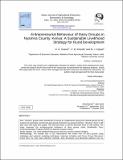Entrepreneurial Behaviour of Dairy Groups in Nyamira County, Kenya: A Sustainable Livelihood Strategy for Rural Development

View/
Publication Date
2016-10-06Author
DO Osewe, PB Kharde, MJ Kipsat
Metadata
Show full item recordAbstract/
Aim: Farmers’ groups were introduced in Kenya as cooperatives during the colonial period for the purpose of promoting commercial agricultural production by peasant farmers. However, there is still poor rural milk trade and supply. The informal sector is still the dominant force in milk trading. The study assessed the entrepreneurial behaviour of dairy groups under Smallholder Dairy Commercialization Program (SDCP) in Nyamira County, Kenya.
Study Design: The study adopted field survey and focus group research designs.
Methodology: The sample size of 220 respondents was drawn from 40 dairy groups using multistage and systemic sampling techniques. Interview schedule and Focus Group Discussion (FGD) were the main data collection methods. Both descriptive and inferential statistics such as numerical counts, frequencies tables and coefficient of multiple determinant (R2) were used for analysis.
Results: Regression model revealed a statistically significant contribution of the program to the entrepreneurial behavior of the dairy groups (0.0019; p<0.05, two-tailed). SDCP contributed 81.74% of the variation in the entrepreneurial behavior (R2 = 0.8174). Majority of the respondents were in survival stage (60.91%) of entrepreneurial growth. In contrast, milk was mainly marketed by individuals and middle men (73.64%) in the informal markets. There were non-viable operational farms averaging 2.7 acres in the programme area.
Conclusion: These findings suggest that the produced milk was locally consumed thus leaving very little surplus for processing and formal marketing. This could be attributed to both the consumers’ preference for the cheap unprocessed milk and inefficiencies in formal trading. The programme provided a platform by which constraints on livelihood strategies such as access to credit and investments in dairy farming (76.69%) could be prioritised for action to remove them and the links between them identified for sustainability. The study recommends development of holistic dairy policy that integrates both small and large dairy businesses. The Government, therefore, needs to up-scale the programme to other parts of the country especially those with higher poverty levels than the national average of 42 per cent. Crowd funding could also give a start-up capital for the smallholder dairy farmers.
